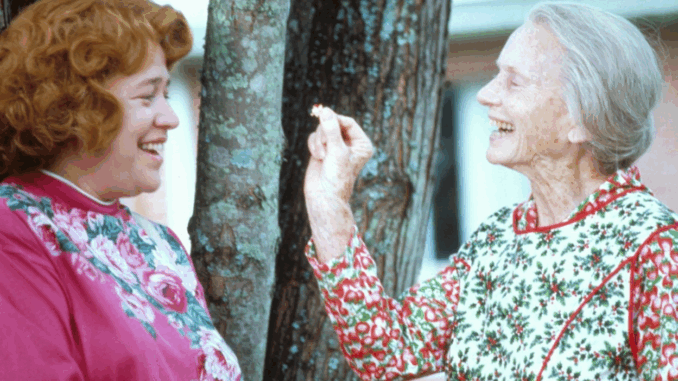
A Story of Friendship, Freedom, and Transformation
At the heart of Fried Green Tomatoes lies a multi-generational tale of love, loyalty, and defiance told through four unforgettable women. Idgie Threadgoode and Ruth Jamison represent the fiery soul of the 1920s South, while Evelyn Couch and Ninny Threadgoode breathe life into the 1980s storyline, connecting past and present. Each woman stands as a symbol of resilience and personal evolution. Together, they weave a powerful narrative that has left a lasting imprint on cinema.
Idgie Threadgoode: The Wild Spirit Who Refused to Be Tamed
Imogen “Idgie” Threadgoode, portrayed with fierce independence, is one of the film’s most complex and beloved characters. Rebellious from a young age and disinterested in societal expectations, Idgie defies every box the Southern norms try to put her in. From wearing pants to running the Whistle Stop Café, she chooses freedom, justice, and deep, loyal love — even if it means breaking the rules.
Her relationship with Ruth Jamison is more than a close friendship — it is a quiet defiance of conservative norms and an enduring emotional bond that speaks volumes without ever needing a label. Through Idgie, the film explores themes of identity, gender roles, and chosen family. Her fire never dims, not even in grief, and her love becomes her legacy.
Ruth Jamison: Grace and Strength in Quiet Defiance
In contrast to Idgie’s rebellious energy, Ruth Jamison embodies grace, endurance, and quiet strength. Initially introduced as a gentle, traditionally feminine woman trapped in an abusive marriage, Ruth’s journey is one of survival and awakening. Her decision to leave her husband — a dangerous choice for a woman of her time — and raise her child with Idgie, signals a powerful act of liberation.
Ruth is the emotional heartbeat of the story. Her nurturing spirit, her warmth, and her resilience make her both sympathetic and heroic. Her death is one of the most emotionally devastating moments of the film, but her presence continues to guide and shape Idgie long after she’s gone. Ruth reminds us that softness is not weakness, and love — even in quiet form — can be a revolutionary act.
Evelyn Couch: The Woman Who Needed to Break Free

When viewers first meet Evelyn Couch in the 1980s timeline, she is a woman stuck in a cycle of mediocrity. Overlooked, underappreciated, and weighed down by self-doubt, Evelyn’s life is a dull routine. But her chance encounters with the eccentric Ninny Threadgoode ignite a personal transformation that becomes just as important as the story of Idgie and Ruth.
Evelyn’s growth is both comedic and profound. Inspired by the tales of Whistle Stop, she begins to rediscover her confidence, her sexuality, and her voice. She fights back — sometimes literally — against societal roles that had caged her for years. Evelyn’s arc mirrors many women’s journeys through midlife crises and gender expectations, making her one of the most relatable characters in the film.
Ninny Threadgoode: The Bridge Between Eras
Ninny Threadgoode is more than just a sweet old woman in a nursing home — she’s the keeper of Whistle Stop’s soul. Her whimsical, sometimes mysterious storytelling acts as the thread that ties past to present, blending truth, fiction, and memory into one powerful narrative. Whether or not she is Idgie (a popular fan theory), Ninny’s purpose is clear: to awaken Evelyn and pass on a legacy of strength, rebellion, and community.
Through Ninny, Fried Green Tomatoes honors the tradition of oral history and female storytelling. She’s a living archive of a life well-lived, one filled with heartbreak, adventure, and purpose. Her gentle mischief, optimism, and empathy make her not just a narrator, but a central force in the lives of those she touches.
Conclusion: Four Lives, One Unbreakable Bond
Together, Idgie, Ruth, Evelyn, and Ninny embody different forms of courage — be it through love, survival, personal growth, or storytelling. Fried Green Tomatoes endures as a film not because of plot twists or flashy visuals, but because of the emotional resonance of these four women. Their struggles are timeless, their victories hard-won, and their friendships unforgettable.
In a world still learning to listen to women’s stories, these characters continue to whisper truths that resonate across decades. Whether we identify with Idgie’s fire, Ruth’s quiet resolve, Evelyn’s awakening, or Ninny’s wisdom, one thing is certain: these women have carved out a place in cinematic history where the bonds of sisterhood remain unshakable.
